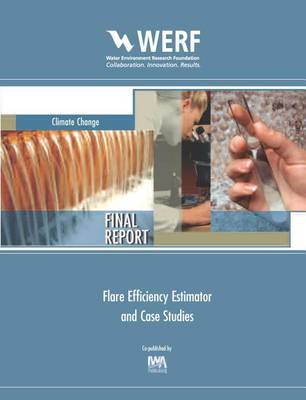Anaerobic digestion of sludge at wastewater treatment plants and biological decay of organic matter in landfills primarily generates methane (CH4) and carbon dioxide (CO2) along with other secondary by-products. Although, CH4 evolved from such processes is routinely captured for beneficial use (combined heat and power generation), the unused CH4 generated from these processes is routinely flared for safe and less environmentally harmful disposal. Due to high inert gas and moisture content, these gases have a low heating value and lower flaring-efficiency at the flares. Furthermore, environmental factors such as wind velocity, atmospheric pressure and relative humidity also play a significant role in affecting the combustion efficiency, especially at the unconfined and unassisted 'candlestick' flares. However, the prevalent understanding is that flaring provides nearly complete combustion of CH4 contained within the digester or landfill gas and converts it to CO2 and flue gases contain insignificant amounts of CH4 or GHG emissions. The most widely accepted reference to estimate flaring-efficiency, EPA's Emissions Factors and AP-42 (1998), recommends using a value between 98 to 100% (99% as a default) as flaring-efficiency for the candlestick flares operating on landfill or digester gas. However, simply assuming 99% combustion efficiency can significantly underestimate the GHG emissions.
Leveraging the past research work done at the University of Alberta's (UoA's) Flare Research Group, an emissions calculation method has been developed as part of this research project. This method has been converted into a stand-alone tool, the Flare Efficiency Estimator (FEE). FEE has flare gas composition and flaring conditions such as flare gas throughput, flare size, wind speed, gas temperature, ambient temperature, and atmospheric pressure input parameters. FEE can help estimate the combustion efficiency as well as fugitive GHG emissions from the digester gas and landfill gas flares. FEE was originally developed under this project (U2R08) and expanded further under the OWSO11C10 project to include the NOx emissions. The most current version of FEE uses the 100-year global warming potential (GWP) of CH4 as 25 CO2e (IPCC, 2007).
To demonstrate the use of the FEE to estimate fugitive GHG emissions, data from two wastewater treatment plants (WWTP), one from Georgia and another from Tennessee are presented as case studies. These case studies were developed using the first version of FEE and did not include NOx emissions estimate. For the Tennessee case study, gas flaring data for a 100-mgd capacity WWTP were analyzed. With an average digester gas flaring volume of nearly 203,000 ft3/day and 70% CH4 fraction, FEE estimated a flaring-efficiency of 95.5%. Which meant an estimated 834 MT CO2e/yr were emitted in the atmosphere due to flaring inefficiency. Using the 99% flaring-efficiency assumption per EPA AP-42, these estimates would have been underreported by approximately 649 MT CO2e/yr. Similarly, for the Georgia case study, gas flaring data and prevalent flaring conditions for an 80-mgd capacity plant were evaluated. With an average digester gas flaring volume of nearly 133,000 ft3/day and 65% CH4 fraction, FEE estimated a flaring-efficiency of 94.5% which meant an estimated 759 MT CO2e/yr were emitted in the atmosphere due to flaring inefficiency. Using the 99% flaring-efficiency assumption per EPA AP-42, these estimates would have been only 138 MT CO2e/yr, an underestimating of GHG emissions by approximately 621 MT CO2e/yr.
FEE is available online from this NYSERDA webpage: http://www.nyserda.ny.gov/en/Commercial-and-Industrial/Sectors/Municipal-Water-and-Wastewater-Facilities/Final-Reports-for-Water-and-Wastewater-Technology-and-Demonstration-Projects.aspx
- ISBN10 1780404883
- ISBN13 9781780404882
- Publish Date 20 November 2013
- Publish Status Active
- Publish Country GB
- Imprint IWA Publishing
- Format eBook
- Pages 48
- Language English
